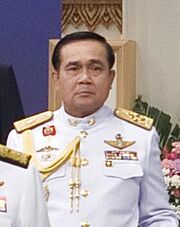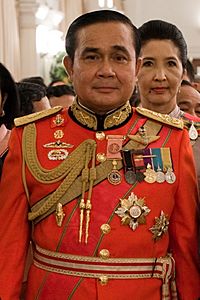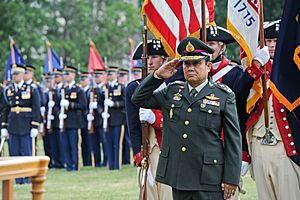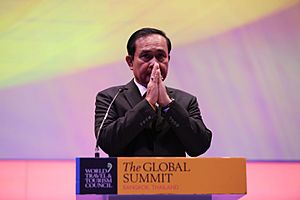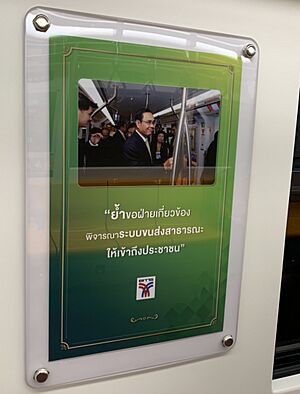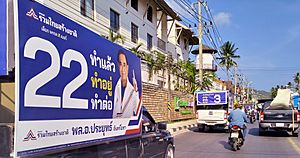Prayut Chan-o-cha facts for kids
Quick facts for kids
Prayut Chan-o-cha
MPCh MWM TChW RMK PC
|
|
|---|---|
|
ประยุทธ์ จันทร์โอชา
|
|
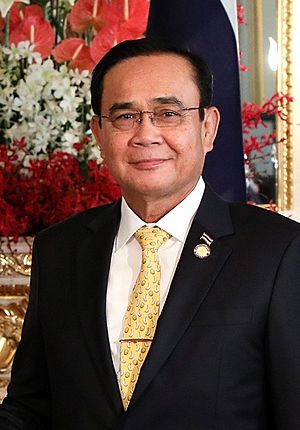
Prayut in 2019
|
|
| Privy Councillor of Thailand | |
| Assumed office 29 November 2023 |
|
| Monarch | Vajiralongkorn |
| 29th Prime Minister of Thailand | |
| In office 24 August 2014 – 22 August 2023 |
|
| Monarch | Bhumibol Adulyadej Vajiralongkorn |
| Deputy |
See list
Prawit Wongsuwon
Pridiyathorn Devakula Yongyuth Yuthavong Thanasak Patimaprakorn Wissanu Krea-ngam Somkid Jatusripitak Narong Pipathanasai Prajin Juntong Chatchai Sarikulya Anutin Charnvirakul Jurin Laksanawisit Don Pramudwinai Supattanapong Punmeechaow |
| Preceded by | Niwatthamrong Boonsongpaisan (acting) |
| Succeeded by | Srettha Thavisin |
| Minister of Defence | |
| In office 10 July 2019 – 1 September 2023 |
|
| Prime Minister | Himself Prawit Wongsuwon (acting) |
| Preceded by | Prawit Wongsuwon |
| Succeeded by | Sutin Klungsang |
| Leader of the National Council for Peace and Order | |
| In office 22 May 2014 – 16 July 2019 |
|
| Deputy |
See list
Prawit Wongsuwon
Thanasak Patimaprakorn Narong Pipathanasai Prajin Juntong Adul Saengsingkaew |
| Preceded by | Position established |
| Succeeded by | Position abolished |
| Commander-in-Chief of the Royal Thai Army | |
| In office 1 October 2010 – 30 September 2014 |
|
| Preceded by | Anupong Paochinda |
| Succeeded by | Udomdej Sitabutr |
| Member of the National Legislative Assembly | |
| In office 11 October 2006 – 28 January 2008 |
|
| Personal details | |
| Born | 21 March 1954 Mueang Nakhon Ratchasima, Nakhon Ratchasima, Thailand |
| Political party | Independent |
| Other political affiliations |
|
| Spouse |
Naraporn Rotchanachan (m. 1984)
|
| Children | 2 |
| Education | Armed Forces Academies Preparatory School Chulachomklao Royal Military Academy |
| Signature (English) | |
| Signature | |
| Nickname | Tuu (ตู่) |
| Military service | |
| Branch/service | Royal Thai Army |
| Years of service | 1976–2014 |
| Rank | General |
| Commands |
|
| Battles/wars |
|
Prayut Chan-o-cha (born 21 March 1954) is a former Thai politician and army officer. He was the 29th prime minister of Thailand from 2014 to 2023. He came to power after leading a military takeover, called a coup d'état, in 2014. From 2019 to 2023, he was also the minister of defence.
Before becoming prime minister, Prayut was the commander-in-chief of the Royal Thai Army from 2010 to 2014. He led the group that took control of the country, called the National Council for Peace and Order (NCPO). The NCPO was a military junta, which is a government run by military leaders.
During a time of political disagreement in Thailand in 2013 and 2014, Prayut first said the army would stay neutral. However, in May 2014, he led the coup against the government. As leader, he created a temporary set of rules for the country that gave him a lot of power. A group of leaders, mostly from the military, later appointed him as prime minister.
After the 2023 Thai general election, Prayut announced he was retiring from politics. He was succeeded by Srettha Thavisin. After his retirement, he was appointed as a Privy Councilor, an advisor to the king.
Contents
Early Life and School
Prayut was born in Nakhon Ratchasima, Thailand. His father was an army colonel and his mother was a school teacher. He was the oldest of four children. Because his father was in the army, his family moved often, and he attended several different schools.
He went to the Armed Forces Academies Preparatory School for his senior year of high school. In 1976, he entered the Chulachomklao Royal Military Academy and graduated with a degree in science.
Military Career
Becoming an Army Leader
After graduating from the military academy, Prayut began his career in the army. He served in the 21st Infantry Regiment, which is a special unit known as the Queen's Guards. Over the years, he moved up in rank.
Like other important military leaders, Prayut was part of a group in the army called the "eastern tigers." Many of these leaders started their careers in the 2nd Infantry Division, which is based in eastern Thailand.
After a coup in 2006, Prayut was appointed to the National Legislative Assembly, which is a group that helps make laws. He also served on the boards of several companies, including a state power company and the Thai Military Bank.
Army Chief (2010–2014)
In 2010, Prayut became the commander-in-chief of the Royal Thai Army. He said his main goals were to protect Thailand and the monarchy.
During political protests in 2010, Prayut was part of a special government group created to handle the situation. He was seen as a strong leader within the military.
In 2011, he was part of the opposition to the Pheu Thai Party during the general election. He urged people to vote for parties that would protect the monarchy. Even though he said this, the Pheu Thai Party won the election.
In late 2011, Prayut spoke out against a group that wanted to change the constitution and the country's lèse majesté law, which is a law that makes it illegal to insult the royal family.
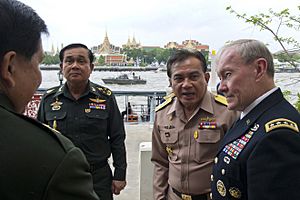
In 2012, Prayut defended the army's use of a device called the GT200, even though scientific tests showed it did not work. He asked people to stop criticizing it.
In May 2013, Prayut sold land in Bangkok for 600 million baht. When reporters asked him about it, he said the land had belonged to his family since he was a child and that the media should not question him about it.
Leading the Country (2014–2019)
The 2014 Coup
In 2013 and 2014, there were large political protests in Thailand. Prayut declared martial law, which means the military took control of the country to keep order. He said it was not a coup at first.
However, on May 22, 2014, he led a coup against the government. He took control of the media, set a curfew (a rule requiring people to stay indoors at certain times), and banned gatherings of more than four people.
On May 26, King Bhumibol Adulyadej officially approved the coup, which helped make it seem legitimate. Prayut then began giving weekly speeches on television to explain his government's policies.
Prime Minister
On July 22, 2014, Prayut created a temporary constitution that gave him an official pardon for leading the coup and granted him wide-ranging powers. A new national assembly, made up mostly of military officers, was created. This assembly voted for Prayut to become the new prime minister. He was officially appointed on August 24, 2014.
Prayut's government was known for being strict. He introduced "twelve values" based on traditional Thai ideas and suggested they be taught in schools. His government also limited what people could say about democracy or the government online and in the media.
In September 2014, after two British tourists were murdered, Prayut made comments about what they were wearing. He asked if tourists would be safe wearing bikinis in Thailand unless they were "not beautiful." He later apologized for his comments.
Using Special Powers
In March 2015, Prayut replaced martial law with a special rule from the temporary constitution called Article 44. This article gave him the power to issue any order to stop actions that he believed threatened peace, national security, or the economy.
He said he would not use this power to harm innocent people. He used it to address problems like aviation safety standards and illegal fishing. However, some people worried that Article 44 gave him too much power without any checks or balances.
Protests and Human Rights
During Prayut's time as leader, there were many limits on people's freedoms. In November 2014, five university students flashed a three-fingered salute from the movie series The Hunger Games as a sign of protest. They were taken to a military camp for "attitude adjustment."
Prayut often joked with the media in ways that were seen as threatening. In one case, he told a journalist, "I'll smack you with the podium." In another, he threw a banana peel at a cameraman.
Prayut promised that a general election would be held in 2015, but it was delayed several times. A new constitution was drafted, and a vote on it was held in 2016. The constitution passed, but groups like the United States, the European Union, and the United Nations criticized the government for not allowing open debate about it.
Reign of King Vajiralongkorn
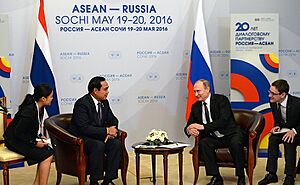
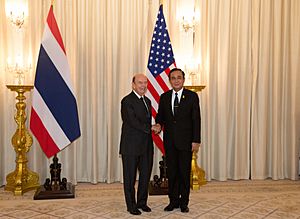
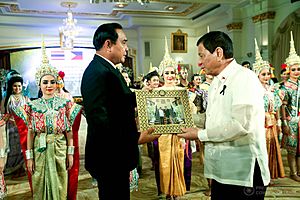
After King Bhumibol died in October 2016, his son Vajiralongkorn became the new king. Prayut announced a one-year mourning period for the country.
In 2017, Prayut's government passed a law that gave King Vajiralongkorn control over the royal fortune, which is one of the largest in the world.
Prayut's government also took more control over Buddhism in Thailand. He was able to influence who became the Supreme Patriarch, the leader of Buddhism in the country.
Second Premiership (2019–2023)
2019 Election
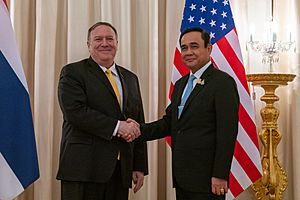
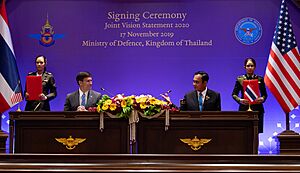
A general election was held in March 2019. Under the 2017 constitution, the prime minister was chosen by both the House of Representatives and the Senate. The Senate members were all appointed by Prayut's military government.
The pro-military Phalang Pracharat Party nominated Prayut as its candidate for prime minister. On June 5, 2019, the National Assembly elected Prayut as prime minister. He received 500 votes, with 249 of those votes coming from the senators he had helped appoint.
Major Protests in 2020
In 2020, large protests broke out against Prayut's government. The protests were started by the court's decision to dissolve a popular opposition party, the Future Forward Party. The protesters called for Prayut to resign, for the constitution to be changed, and for reforms to the monarchy.
Prayut's government responded by arresting protest leaders. In October, major newspapers called for Prayut to resign. He blamed the protesters for hurting the country's economy.
Term Limit Question
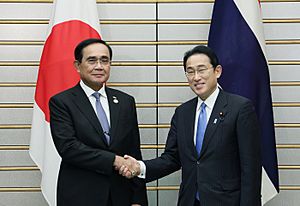
The 2017 constitution says a prime minister can only serve for eight years. Some people argued that Prayut's term should have ended in August 2022, eight years after he first took power in 2014.
The Constitutional Court of Thailand reviewed the case and suspended Prayut from his duties on August 24, 2022. On September 30, the court ruled that his term officially began when the 2017 constitution was enacted. This meant he could stay in power.
2023 Election and Retirement
Prayut ran in the 2023 Thai general election as a candidate for the United Thai Nation Party. However, his party did not win many seats. On July 11, 2023, he announced that he was retiring from politics.
He remained the acting prime minister until the new government was formed. On August 22, 2023, Srettha Thavisin was appointed as the new prime minister.
Privy Councilor
On November 29, 2023, King Vajiralongkorn appointed Prayut as a Privy Councilor. Privy Councilors are advisors to the king.
Personal Life
Prayut's nickname is "Tuu." He is married to Naraporn Chan-o-cha, who was a professor at Chulalongkorn University. They have twin daughters, Thanya and Nittha.
Prayut has said that he regularly talks to a fortune teller for advice. He also wears lucky rings and an elephant hair bracelet to protect himself from bad luck. He encouraged his cabinet members to wear traditional Thai clothing instead of Western suits at meetings.
Royal Decorations
 Thailand:
Thailand:
- 2010 –
 Knight Grand Cordon of the Most Exalted Order of the White Elephant
Knight Grand Cordon of the Most Exalted Order of the White Elephant - 2008 –
 Knight Grand Cordon of the Most Noble Order of the Crown of Thailand
Knight Grand Cordon of the Most Noble Order of the Crown of Thailand - 2024 –
 Knight Grand Commander of the Most Illustrious Order of Chula Chom Klao
Knight Grand Commander of the Most Illustrious Order of Chula Chom Klao - 2023 –
 Order of Ramkeerati
Order of Ramkeerati - 1990 –
 Member of the Rama Medal for Gallantry in Action of the Most Honourable Order of Rama
Member of the Rama Medal for Gallantry in Action of the Most Honourable Order of Rama - 1986 –
 Freemen Safeguarding Medal (Second Class, First Category)
Freemen Safeguarding Medal (Second Class, First Category) - 1989 –
 Border Service Medal
Border Service Medal - 1989 –
 Chakra Mala Medal
Chakra Mala Medal - 2010 –
 Boy Scout Citation Medal of Vajira, First Class
Boy Scout Citation Medal of Vajira, First Class - 2024 –
 King Rama X Royal Cypher Medal, Third Class
King Rama X Royal Cypher Medal, Third Class
- 2010 –
 Malaysia :
Malaysia :
Images for kids
-
Prayut with Indian Prime Minister Narendra Modi, 2018
-
Prayut with U.S. Secretary of State Antony Blinken, 2022
-
Prayut with U.S. Secretary of Defense Lloyd J. Austin III, 2022
-
Prayut with U.S. President Joe Biden, East Asian Leaders Summit, 2022
See also
 In Spanish: Prayut Chan-o-cha para niños
In Spanish: Prayut Chan-o-cha para niños


